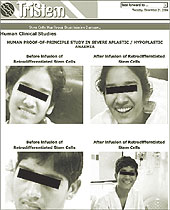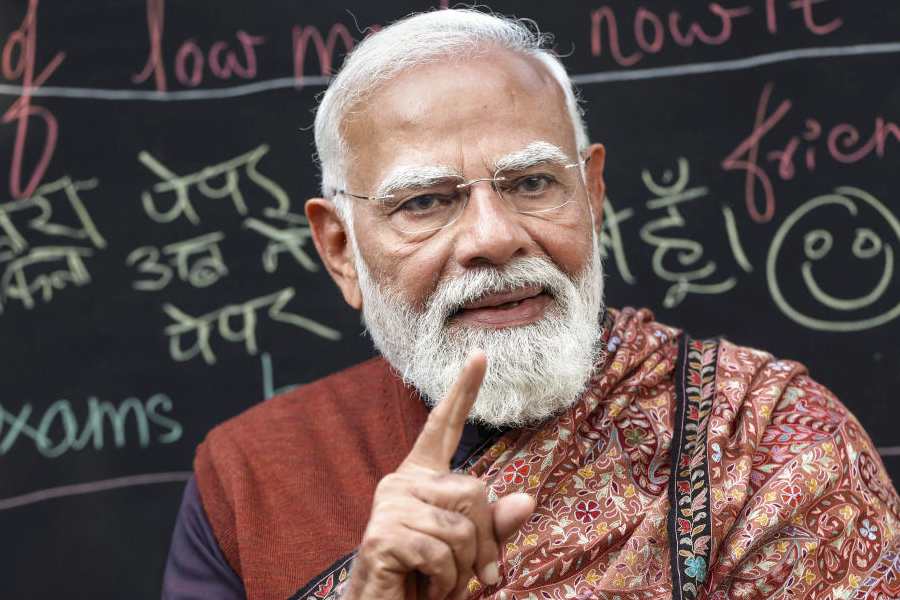 |
| Tall claims: TriStem?s webpage may raise vain hope in millions |
From the website of a biotechnology company in London, a dead man smiles at the world. He was among the four patients in Mumbai with a serious bone marrow disease and a willing member of an alliance that turned patients in India into ?guinea pigs?, with doctors testing an unproven technology, patients being desperate enough to face the unknown and experts not asking the right questions.
The technology from the London-based TriStem Corporation may some day be hailed as a breakthrough to replace damaged bone marrow, brain cells or heart muscles. Or it may be abandoned as futile research. But, for the moment, it has embroiled government doctors in Mumbai and the Indian Council of Medical Research (ICMR), the nation?s top custodian of medical ethics, in a major controversy.
Medical experts say the ICMR scientists and doctors breached ethics earlier this year by using a foreign technology to treat Indian patients before it had been tested in humans elsewhere. The Indian researchers have denied wrongdoing and, instead, are accusing the company itself of unethical practice in prematurely posting study data and photographs of the patients on its website.
TriStem has claimed that the four patients are doing well, but the doctors at the King Edward Memorial (KEM) Hospital, Mumbai, said none of the four responded to the treatment. One patient died last week from pneumonia, which, the KEM doctors emphasised, was a complication of his bone marrow disease and not the treatment. The ICMR officials have said that the other three patients will be continuously monitored as long as necessary.
?The company has made false claims. It?s a flagrant demonstration of self-interest at the cost of the truth,? said Dr Manu Kothari, chairman of the KEM ethics committee. The study began in the first week of August 2004. But by mid-September the ethics committee ordered the study to be suspended after it found that a TriStem scientist had independently visited the patients to ask them how they felt after the treatment and capture them on camera.
?We suspended the study only because of the unethical behaviour of the TriStem scientist,? said Kothari. ?The decision had nothing to do with the treatment or the technology.?
The controversy is centred around a TriStem technology claimed to produce stem cells, a class of wonder cells which, given the right signals, can turn into different types of cells of the human body. The company says it has a technology to convert white blood cells into blood-forming stem cells that can turn into the different cells found in the human blood.
Scientists at an ICMR institute at the KEM used the technology to test whether its works on four patients with aplastic anaemia, a condition in which the bone marrow stops making all blood cells. Information posted by TriStem on its website says that white blood cells were extracted from each patient and converted into the blood-forming stem cells, and then injected back into the patient.
TriStem has described the study as a ?proof-of-principle? human study. Mr Ghazi Dhoot, TriStem chairman, told KnowHOW that it was a ?safety study? to find out whether the stem cells produced through this technology had any toxic effects. However, leading medical experts, including doctors familiar with ethics and laws, say they are surprised by the company?s claims.
?Safety studies are the most dangerous part of clinical trials and are done in healthy volunteers ? not in patients,? said Dr Chandra Gulhati, editor of the Monthly Index of Medical Specialities, India. ?This shows how a little-known company can get its technology evaluated in India through public institutions. No matter what the intentions of the Indian researchers, these four patients served as guinea pigs.?
Concerns about the use of patients in India as ?guinea pigs? have intensifed in recent years after cases where private or public doctors tested unproven drugs or procedures that had been developed abroad by other scientists. A candidate HIV vaccine, a new procedure to treat heart disease, and a new anti-cancer agent are among the unproven technologies that have been tested on Indian patients by different institutions over the past decade. ?I always become suspicious when techniques or products are not tested in their country of origin,? said Dr Samiran Nundy, editor of the Indian Journal of Medical Ethics.
Top ICMR officials disagree with the view that the medical procedure originated in a foreign country. ?It was totally our thinking, entirely our experiment. We bought various reagents from the market and only used a patented technology owned by the company,? said Dr Nirmal Kumar Ganguly, ICMR director-general. The study in humans had also been preceded by several months of laboratory tests and animal experiments in India, he added.
Researchers involved in the study also said that it had been approved by an eight-member scientific committee of the ICMR as well as by the ethics committee of the KEM Hospital. ?All of us felt that it would not harm patients,? said Kothari, ethics committee chairman. ?If it had worked, there would have been enormous benefit to the patients.?
Scientists involved in the study have also defended it on the grounds that the patients had no access to alternative therapy. One official who monitored the study said it should not be called a clinical trial but ?a therapeutic study.?
But medical experts, bioethicists and lawyers have rejected these arguments. Gulhati said that hair-splitting a clinical trial from a therapeutic study is ?the same as describing an act of theft as stealing.?
A study approved on the grounds of lack of access to treatment is ?neither legally tenable, nor morally or ethically correct,? said Pavan Duggal, a lawyer in New Delhi who specialises in technology law. ?Lack of access to treatment doesn?t make somebody a more suitable guinea pig,? said Dr Ranjit Roy Choudhury, a member of the National Ethical Committee of the ICMR.
Experts familiar with rules also say that if what TriStem claims is true, the white blood cells from each patient had been dramatically transformed ? from white blood cells into stem cells. ?This is tantamount to genetic engineering in which case the cells would need approval from the Genetic Engineering Advisory Committee, mandatory for all bioengineered substances,? said Gulhati. However, the researchers involved in the study said that the process by which the white blood cells are transformed into stem cells is not clear.
Stem cell research has gained momentum in recent times with doctors hoping to use them to treat conditions such as diabetes, heart attacks or Parkinson?s disease in which the body has lost cells. Some research teams are trying to harvest stem cells from the body and coax them to grow in the laboratory using a cocktail of the right chemicals. ?The transformation of ordinary white blood cells into stem cells is a novel claim,? said a top scientist involved in stem-cell studies in a leading institution in India. ?We need to be extra-cautious when something new is taken up,? said the researcher who does not wish to be named.
The TriStem technology was developed by biologist Ilham Saleh Abuljadayel, its chief scientific officer. In a paper last year TriStem said that the blood cells could be ?reprogrammed into other types of cells.? It was the first time anyone had shown that adult blood cells could be transformed into stem cells that could give rise to blood cells as well as brain cells and heart muscle cells.
TriStem?s contact in India was G. G. HaemHealth Technologies, a private medical consultancy company in Chandigarh. ?We created stem cells with our technology and handed them to the Indian scientists,? Dhoot told KnowHOW. He claimed that researchers in India had assessed the technology before the clinical study. ?We just provided stem cells ? it was up to the Indian scientists whether to inject it into patients or not,? Dhoot said.










